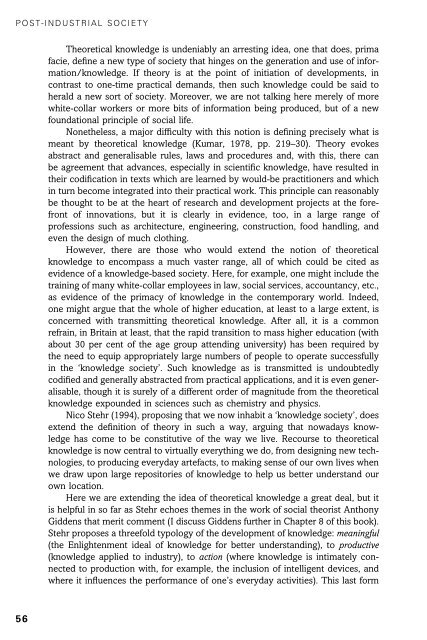Theories of the Information Society, Third Edition - Cryptome
Theories of the Information Society, Third Edition - Cryptome
Theories of the Information Society, Third Edition - Cryptome
You also want an ePaper? Increase the reach of your titles
YUMPU automatically turns print PDFs into web optimized ePapers that Google loves.
POST-INDUSTRIAL SOCIETY<br />
Theoretical knowledge is undeniably an arresting idea, one that does, prima<br />
facie, define a new type <strong>of</strong> society that hinges on <strong>the</strong> generation and use <strong>of</strong> information/knowledge.<br />
If <strong>the</strong>ory is at <strong>the</strong> point <strong>of</strong> initiation <strong>of</strong> developments, in<br />
contrast to one-time practical demands, <strong>the</strong>n such knowledge could be said to<br />
herald a new sort <strong>of</strong> society. Moreover, we are not talking here merely <strong>of</strong> more<br />
white-collar workers or more bits <strong>of</strong> information being produced, but <strong>of</strong> a new<br />
foundational principle <strong>of</strong> social life.<br />
None<strong>the</strong>less, a major difficulty with this notion is defining precisely what is<br />
meant by <strong>the</strong>oretical knowledge (Kumar, 1978, pp. 219–30). Theory evokes<br />
abstract and generalisable rules, laws and procedures and, with this, <strong>the</strong>re can<br />
be agreement that advances, especially in scientific knowledge, have resulted in<br />
<strong>the</strong>ir codification in texts which are learned by would-be practitioners and which<br />
in turn become integrated into <strong>the</strong>ir practical work. This principle can reasonably<br />
be thought to be at <strong>the</strong> heart <strong>of</strong> research and development projects at <strong>the</strong> forefront<br />
<strong>of</strong> innovations, but it is clearly in evidence, too, in a large range <strong>of</strong><br />
pr<strong>of</strong>essions such as architecture, engineering, construction, food handling, and<br />
even <strong>the</strong> design <strong>of</strong> much clothing.<br />
However, <strong>the</strong>re are those who would extend <strong>the</strong> notion <strong>of</strong> <strong>the</strong>oretical<br />
knowledge to encompass a much vaster range, all <strong>of</strong> which could be cited as<br />
evidence <strong>of</strong> a knowledge-based society. Here, for example, one might include <strong>the</strong><br />
training <strong>of</strong> many white-collar employees in law, social services, accountancy, etc.,<br />
as evidence <strong>of</strong> <strong>the</strong> primacy <strong>of</strong> knowledge in <strong>the</strong> contemporary world. Indeed,<br />
one might argue that <strong>the</strong> whole <strong>of</strong> higher education, at least to a large extent, is<br />
concerned with transmitting <strong>the</strong>oretical knowledge. After all, it is a common<br />
refrain, in Britain at least, that <strong>the</strong> rapid transition to mass higher education (with<br />
about 30 per cent <strong>of</strong> <strong>the</strong> age group attending university) has been required by<br />
<strong>the</strong> need to equip appropriately large numbers <strong>of</strong> people to operate successfully<br />
in <strong>the</strong> ‘knowledge society’. Such knowledge as is transmitted is undoubtedly<br />
codified and generally abstracted from practical applications, and it is even generalisable,<br />
though it is surely <strong>of</strong> a different order <strong>of</strong> magnitude from <strong>the</strong> <strong>the</strong>oretical<br />
knowledge expounded in sciences such as chemistry and physics.<br />
Nico Stehr (1994), proposing that we now inhabit a ‘knowledge society’, does<br />
extend <strong>the</strong> definition <strong>of</strong> <strong>the</strong>ory in such a way, arguing that nowadays knowledge<br />
has come to be constitutive <strong>of</strong> <strong>the</strong> way we live. Recourse to <strong>the</strong>oretical<br />
knowledge is now central to virtually everything we do, from designing new technologies,<br />
to producing everyday artefacts, to making sense <strong>of</strong> our own lives when<br />
we draw upon large repositories <strong>of</strong> knowledge to help us better understand our<br />
own location.<br />
Here we are extending <strong>the</strong> idea <strong>of</strong> <strong>the</strong>oretical knowledge a great deal, but it<br />
is helpful in so far as Stehr echoes <strong>the</strong>mes in <strong>the</strong> work <strong>of</strong> social <strong>the</strong>orist Anthony<br />
Giddens that merit comment (I discuss Giddens fur<strong>the</strong>r in Chapter 8 <strong>of</strong> this book).<br />
Stehr proposes a threefold typology <strong>of</strong> <strong>the</strong> development <strong>of</strong> knowledge: meaningful<br />
(<strong>the</strong> Enlightenment ideal <strong>of</strong> knowledge for better understanding), to productive<br />
(knowledge applied to industry), to action (where knowledge is intimately connected<br />
to production with, for example, <strong>the</strong> inclusion <strong>of</strong> intelligent devices, and<br />
where it influences <strong>the</strong> performance <strong>of</strong> one’s everyday activities). This last form<br />
56
















